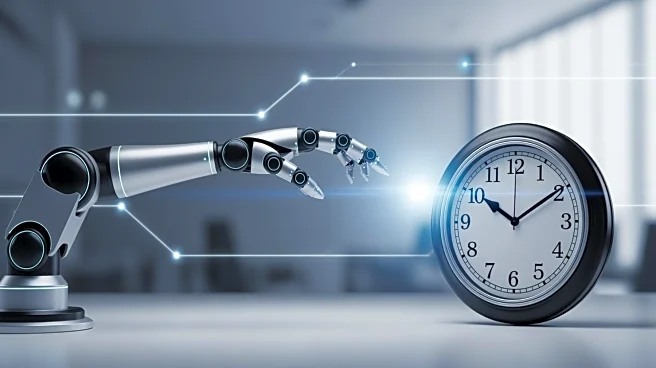What's Happening?
As companies like Amazon and Salesforce announce significant layoffs and hiring freezes, the role of artificial intelligence (AI) in the workforce is under scrutiny. Amazon recently confirmed plans to
cut 14,000 corporate jobs, attributing the decision to the integration of generative AI, which is expected to transform work processes. Federal Reserve Chair Jerome Powell noted that many companies are either reducing hiring or conducting layoffs, often citing AI as a factor. Historically, technological advancements have reshaped the workforce, transitioning from agrarian to industrial economies, and now to a digital one. The impact of AI is evident in sectors like software development, where AI is beginning to perform tasks traditionally done by humans.
Why It's Important?
The integration of AI into the workforce has significant implications for the U.S. economy and labor market. While AI has the potential to increase efficiency and productivity, it also poses a risk of job displacement, particularly in industries heavily reliant on technological skills. A report from the National Science Association suggests that AI could disrupt 25% of jobs in the next three years, with sectors like finance, retail, and education being most vulnerable. However, industries requiring human judgment or manual dexterity, such as agriculture and government, are less likely to be affected. The broader economic impact will depend on how companies and policymakers manage this transition, including retraining workers and creating new job opportunities.
What's Next?
The future of AI in the workforce will largely depend on the strategies adopted by companies and policymakers. If AI is used to complement human workers and empower employees, it could lead to increased wages and reduced inequality. However, if AI primarily serves to automate tasks, it may result in fewer job opportunities. The response from major stakeholders, including government and industry leaders, will be crucial in shaping the outcome. Programs to help workers transition to new roles and acquire necessary skills will be essential to mitigate the negative impacts of AI on employment.
Beyond the Headlines
The ethical and social implications of AI in the workforce are significant. The potential for AI to exacerbate inequality and disenfranchise workers raises questions about the responsibility of companies and governments to ensure fair and equitable outcomes. The historical context of technological revolutions suggests that while efficiency gains are possible, they must be balanced with considerations for worker welfare and societal impact. The ongoing debate about AI's role in the economy highlights the need for thoughtful and inclusive policy-making.











